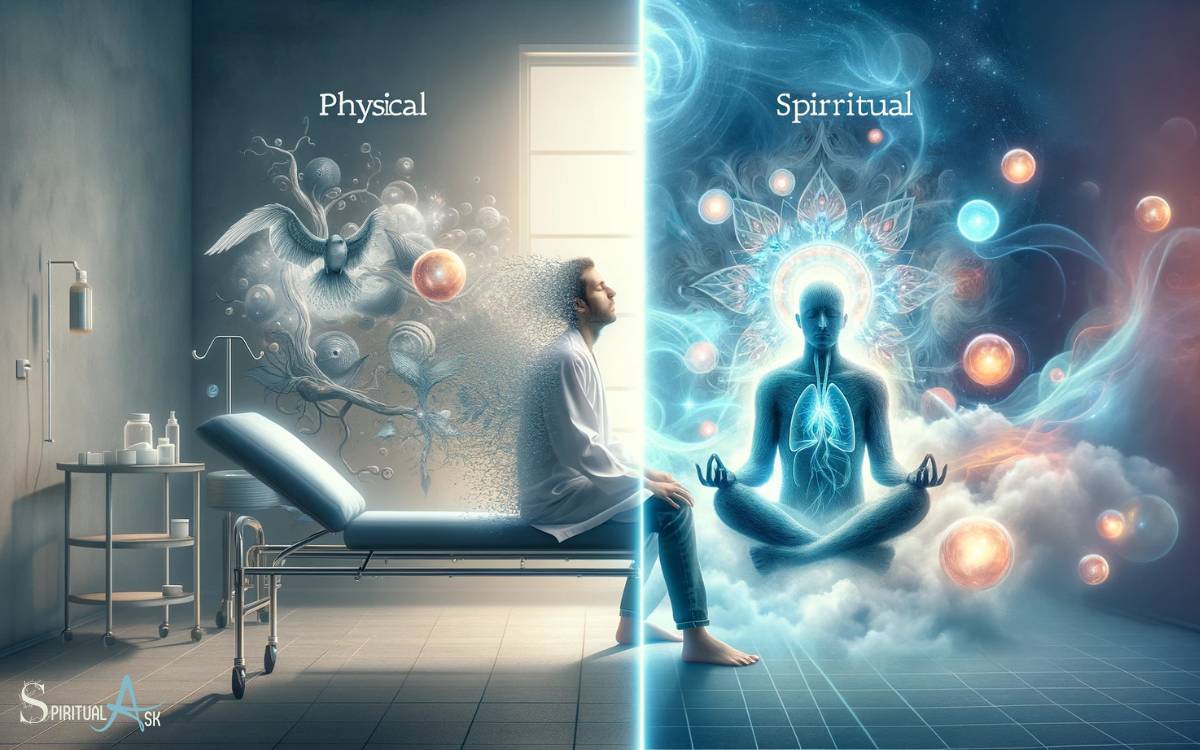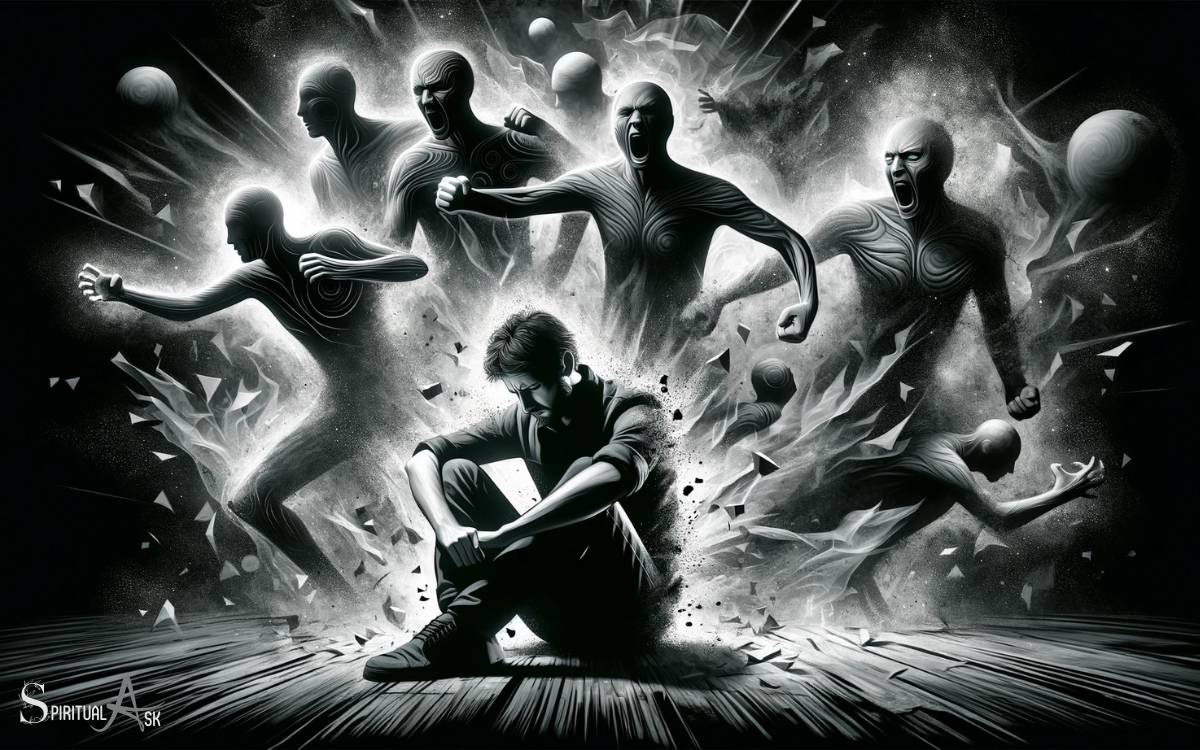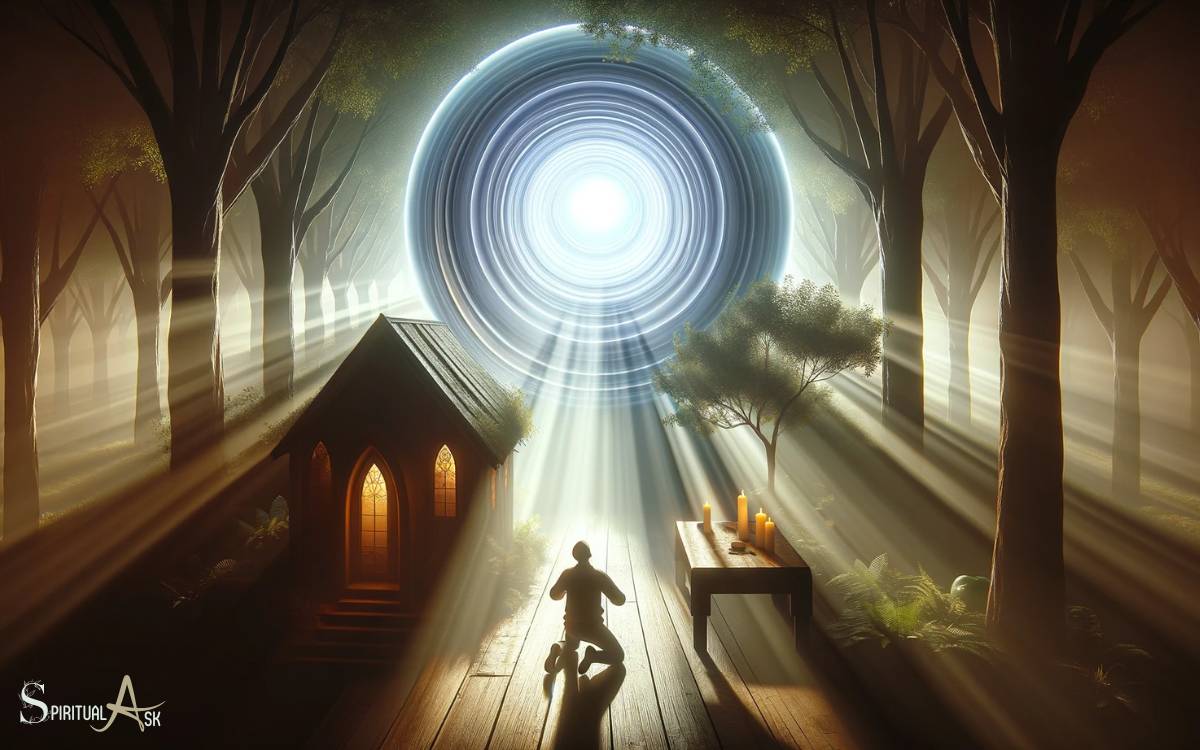Vertigo And Spiritual Warfare: Physical Manifestations!
Vertigo and Spiritual Warfare are often linked due to the belief that certain physical manifestations of discomfort or disorientation could be a result of negative spiritual influences or attacks.
Spiritual warfare is a concept that refers to the ongoing battle between good and evil, or the struggle between opposing spiritual forces.
In some belief systems, it is thought that these forces can influence a person’s physical well-being, including causing symptoms such as vertigo – a sensation of dizziness, spinning, or unsteadiness.
However, it is crucial to note that vertigo can and often does have medical explanations and should not always be attributed to spiritual factors.
It is essential to approach the topic of vertigo and spiritual warfare with an open mind, while also acknowledging the importance of seeking medical advice and considering other potential causes of vertigo symptoms.
While some may find comfort in associating their vertigo with spiritual warfare, it is crucial to maintain a balance between exploring spiritual explanations and addressing medical concerns that could be the root cause of the issue.
Always consult a healthcare professional when experiencing persistent or severe vertigo symptoms.

Key Takeaway
Understanding the Connection: Vertigo and Spiritual Warfare
| Vertigo Symptoms | Possible Spiritual Warfare Manifestations |
|---|---|
| Dizziness | Feelings of confusion or disorientation |
| Nausea | Spiritual unease or turmoil |
| Headache | Mentally overwhelmed by spiritual attacks |
| Spinning sensation | Feeling of being pulled in many directions spiritually |
| Loss of balance | Struggling to maintain spiritual grounding |
| Tinnitus | Distraction from prayer or meditation |
| Vision changes | Difficulty focusing on spiritual truths |
Five Facts About Vertigo and Spiritual Warfare
Understanding Vertigo
Vertigo, a condition where you experience a sensation of spinning or swaying when you’re not actually moving, can be both disorienting and distressing.
It’s imperative to discern that vertigo is not a disorder in itself, but rather a symptom indicative of various potential underlying issues.

These can range from benign paroxysmal positional vertigo (BPPV) to Meniere’s disease or vestibular neuritis.
BPPV occurs when tiny calcium particles clump in the canals of the inner ear, signaling your brain about head and body movements relative to gravity incorrectly.
Meniere’s disease involves a build-up of fluid and changing pressure in the ear, while vestibular neuritis is attributed to viral infections causing inflammation around nerves essential for balance. Understanding the etiology is crucial for effective management.
Physical Vs Spiritual Symptoms
You must discern whether symptoms of vertigo are rooted in physical conditions or if they signify spiritual turmoil. Analyzing the characteristics of physical vertigo can provide clarity and guide appropriate medical intervention.
Conversely, exploring spiritual symptoms requires a different framework, one that acknowledges the potential for non-physical battles manifesting as physiological disturbances.

Identifying Physical Vertigo
Distinguishing between physical vertigo symptoms and those that might be described as spiritual requires a methodical assessment of the individual’s experienced sensations and potential medical causes.
Physical vertigo generally stems from issues within the vestibular system, including the inner ear and brain.
You’ll want to consider the following:
Sensory Conflicts:
- Unease when your visual input clashes with your equilibrium.
- Disorientation in environments with excessive stimuli.
Medical Conditions:
- Inner ear disorders such as BPPV or Meniere’s disease.
- Neurological issues like migraines or multiple sclerosis.
These lists should evoke concern for the physical well-being and empathy for the affected, highlighting the profound impact of vertigo on daily life. Understanding these can lead to appropriate medical intervention and relief from distressing symptoms.
Spiritual Symptoms Explored
While physical vertigo is often rooted in tangible medical conditions, spiritual vertigo lacks empirical evidence and is instead characterized by feelings of disconnection and existential disorientation.
You must discern between physical symptoms, which can be diagnosed and treated medically, and spiritual symptoms that are more elusive and subjective.

| Physical Symptoms | Spiritual Symptoms |
|---|---|
| Dizziness | Sense of Unreality |
| Nausea | Emotional Numbness |
| Balance Issues | Existential Questioning |
Understanding this distinction is crucial as it guides the approach to treatment or management. Physical vertigo calls for a clinical response while spiritual vertigo may benefit from introspective practices or philosophical inquiry.
It’s imperative to consider the nuanced experiences of individuals who report these symptoms, ensuring a holistic approach to their well-being.
Distinguishing Spiritual Battles
As we consider the differences between physical and spiritual experiences of vertigo, it’s essential to recognize the unique challenges in identifying and addressing spiritual battles manifesting as symptoms like emotional numbness or existential questioning.
The analytical approach requires a careful assessment of symptoms:
Physical Vertigo
- Often linked with inner ear disorders
- Can be evaluated by medical tests
Spiritual Vertigo
- May present as a disconnection from one’s beliefs or values
- Could lead to a profound sense of disorientation without a physical cause
Understanding these nuances allows you to approach your experiences with discernment, considering both the physical and the spiritual realms when seeking solutions to the feelings of imbalance you’re facing.
Historical Beliefs on Vertigo

Throughout history, various cultures have often interpreted vertigo as a manifestation of supernatural forces or divine displeasure. Your understanding of these historical interpretations can be deepened by considering the varied beliefs held by different societies.
Analyze the following table, which outlines a comparison of beliefs from notable epochs and civilizations:
| Culture/Epoch | Belief Regarding Vertigo |
|---|---|
| Ancient Greece | Punishment from gods for hubris |
| Medieval Europe | Possession by malevolent spirits |
| Indigenous Shamanism | Imbalance in spiritual energy |
This table encapsulates the confluence of medical symptoms and spiritual interpretations that have shaped humanity’s response to vertigo. It illustrates a pattern of ascribing a metaphysical cause to what is now known to be a physiological condition.
Your grasp of the historical context provides a foundation for understanding the evolution of the perception of vertigo.
Spiritual Warfare Explained
Spiritual warfare, often depicted as a battle for the soul, is a concept rooted in the belief that individuals are engaged in a constant struggle against supernatural forces.

This clash encompasses:
Various religious traditions
- Christianity: Describes a battle between angels and demons, with human souls at stake
- Other faiths: Have analogous concepts involving good versus evil entities
Personal experiences
- Inner turmoil: Interpreted as demonic temptation or divine testing
- External challenges: Seen as manifestations of a cosmic struggle
The analytical examination of spiritual warfare requires a dispassionate approach, acknowledging the emotional weight it carries for believers.
It’s crucial to recognize how these beliefs influence behavior and worldview, without dismissing the deeply personal nature of such experiences for those involved.
Signs of Spiritual Attack
You may observe certain disturbances that suggest you’re experiencing a spiritual attack. Symptoms such as unexplained emotional turmoil, disturbed sleep patterns, and persistent negative thoughts might indicate an underlying spiritual conflict.

It’s crucial to analyze these signs with both a critical eye and an awareness of their potential implications for your spiritual well-being.
Unexplained Emotional Turmoil
Experiencing sudden, inexplicable feelings of anxiety or despair might indicate a spiritual attack, particularly when these emotions lack a clear cause or trigger.
Your internal equilibrium is disrupted without warning, leaving you grappling with emotions that seem to emerge from the ether.
Signs that your emotional turmoil may be a manifestation of spiritual warfare:
- Intense and unprovoked waves of fear or sadness.
- A pervasive sense of hopelessness that does not align with your life circumstances.
These experiences can profoundly affect your mental state, leading to a cascade of negative emotions that seem disconnected from your reality.
It’s crucial to approach such phenomena with a discerning eye, acknowledging potential spiritual influences while also considering psychological and physiological factors.
Disturbed Sleep Patterns
Disturbed sleep patterns, such as chronic insomnia or nightmares, may often serve as indicators of spiritual warfare, disrupting one’s nocturnal peace and signaling deeper unrest. You must recognize that sleep is not merely a physical necessity but also a spiritual respite.

Therefore, when you experience persistent sleep disturbances without a clear physiological cause, it’s crucial to consider a spiritual dimension.
Analyzing these patterns through a scholarly lens reveals that such disruptions can be manifestations of spiritual unease. They may represent an assault on your subconscious, a realm where spiritual battles are frequently waged.
It’s essential to scrutinize these patterns objectively, as understanding them could provide insight into the nature of the spiritual conflicts you’re facing, guiding you toward appropriate responses.
Persistent Negative Thoughts
Persistent negative thoughts may be symptomatic of spiritual attacks, affecting individuals with a tenacity that suggests an origin beyond mere psychological distress.
These intrusive thoughts can manifest in various forms:
- Doubt and self-criticism
- You’re not good enough
- Your efforts are futile
- Fear and anxiety
- Something terrible will happen
- You can’t trust anyone
Analyzing these patterns from a scholarly perspective, one must consider the profound impact on your emotional well-being. It’s crucial to discern whether these thoughts are disproportionate reactions to life’s challenges or potential signs of spiritual warfare.
Understanding may empower you to seek appropriate support, whether it be through counseling, spiritual guidance, or both, to navigate these trying mental landscapes.
Vertigo in Religious Texts

Throughout history, various religious texts have depicted vertigo not only as a physical ailment but also as a metaphor for spiritual disorientation.
These ancient writings often use the sensation of spinning and instability to convey deeper existential and moral uncertainties.
As you delve into the sacred scriptures, you might find that vertigo symbolizes the loss of spiritual direction or the chaos of straying from divine guidance.
| Emotion | Religious Text | Interpretation |
|---|---|---|
| Fear | Psalms | A cry for help amid life’s tumultuous storms |
| Hope | Proverbs | The promise of guidance and stability through wisdom |
| Despair | Job | The overwhelming confusion faced during trials |
The table above seeks to engage your emotions, reflecting the varied experiences associated with spiritual vertigo across different contexts within religious narratives.
Coping Strategies for Vertigo

When you experience vertigo, adopting certain strategies can mitigate its impact and help regain a sense of balance. It is vital to approach this condition with a methodical mindset, focusing on evidence-based interventions.
Consider the following:
Environmental Adjustments
- Reducing visual stimuli: Simplifying your surroundings can decrease dizziness.
- Safety modifications: Installing grab bars or using walking aids enhances stability.
Behavioral Techniques
- Stress management: Practices such as meditation or deep-breathing exercises can alleviate symptoms exacerbated by anxiety.
- Dietary changes: Limiting intake of substances like caffeine or alcohol that may trigger vertigo episodes.
Seeking Spiritual Guidance
While coping strategies for vertigo are grounded in practical interventions, some individuals also seek spiritual guidance as a complementary approach to find solace and meaning in their experiences.

As you explore this realm, it’s crucial to approach it with an analytical mindset, assessing the potential benefits and implications of integrating spiritual practices with conventional treatments.
| Aspect | Consideration | Potential Outcome |
|---|---|---|
| Personal Beliefs | Alignment with spiritual or religious convictions | Enhanced coping ability |
| Community Support | Engagement with supportive spiritual communities | Increased emotional support |
| Mindfulness | Inclusion of meditative practices for focus | Improved mental clarity |
| Symbolism | Interpretation of vertigo in a spiritual context | Deeper personal meaning |
| Holistic Wellness | Consideration of spiritual health alongside physical | Comprehensive well-being |
These factors contribute to a holistic understanding of vertigo management, where spiritual guidance may offer additional layers of support for those seeking deeper existential comprehension.
Does Vertigo Have Any Spiritual Significance or Connection to Spiritual Warfare?
Angels, demons, and spiritual warfare are often discussed in spiritual contexts, suggesting that physical symptoms like vertigo could have spiritual implications. However, the connection between vertigo and spiritual warfare is largely interpretative and subjective. Understanding spiritual warfare involves examining the belief that there are unseen spiritual forces at work, both good and evil, that can affect individuals in a variety of ways, including physically. While some may interpret vertigo as a result of spiritual warfare, others may view it as a purely medical condition with no spiritual implications. Ultimately, the connection between vertigo and spiritual warfare is a matter of personal belief and interpretation.
- Physical vs. Spiritual: Vertigo is primarily a medical condition, but some may interpret it as having spiritual significance, particularly if it coincides with spiritual or emotional turmoil.
- Metaphorical Interpretation: In spiritual discourse, vertigo could symbolize being ungrounded or experiencing spiritual disorientation.
- Personal Reflection: Some individuals might see vertigo as a call to examine their spiritual path or a manifestation of spiritual unrest.
While there’s no universal consensus on vertigo’s spiritual significance, it’s crucial to address the medical aspect first. If one feels a spiritual connection, this could warrant further personal or spiritual reflection.
Conclusion
You’ve explored the multifaceted nature of vertigo, from physical to spiritual interpretations. Intriguingly, studies suggest that up to 35% of adults aged 40 years or older in the United States have experienced some form of vestibular dysfunction, including vertigo.
This statistic underscores the importance of a comprehensive approach to understanding and addressing vertigo, one that may benefit from both medical insights and spiritual support, depending on individual beliefs and experiences.
FAQ About Vertigo And Spiritual Warfare
How Can Vertigo Be Related To Spiritual Warfare?
Vertigo may sometimes be a symptom of an underlying spiritual battle. Satan attacks us spiritually, mentally, and physically.
Is Medication The Only Cure For Vertigo?
Medication can alleviate vertigo symptoms, but spiritual warfare must be fought with prayer, faith, and spiritual exercises.
Can Vertigo Be Cured?
Vertigo can be cured with proper diagnosis, medication, and lifestyle changes. Prayer and spiritual growth can also help in some cases.
How Can I Protect Myself From Spiritual Warfare?
To protect yourself from spiritual warfare, stay connected to god, read and meditate on his word, pray regularly, and stay away from sin.






